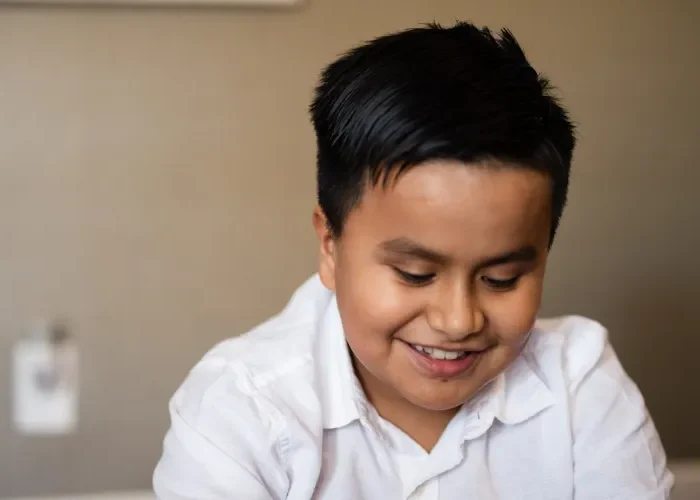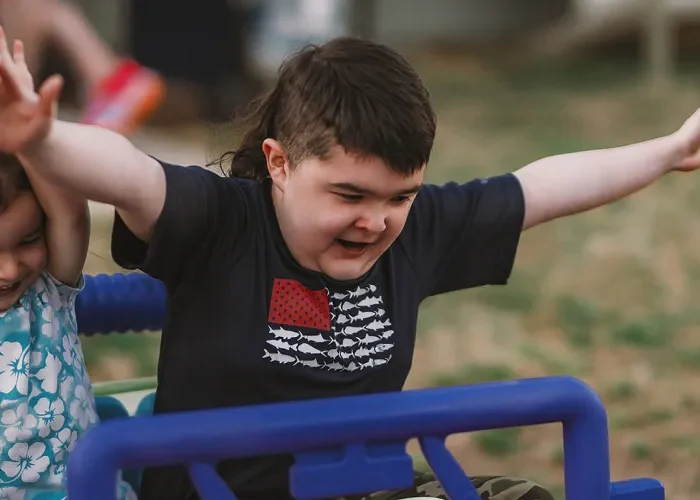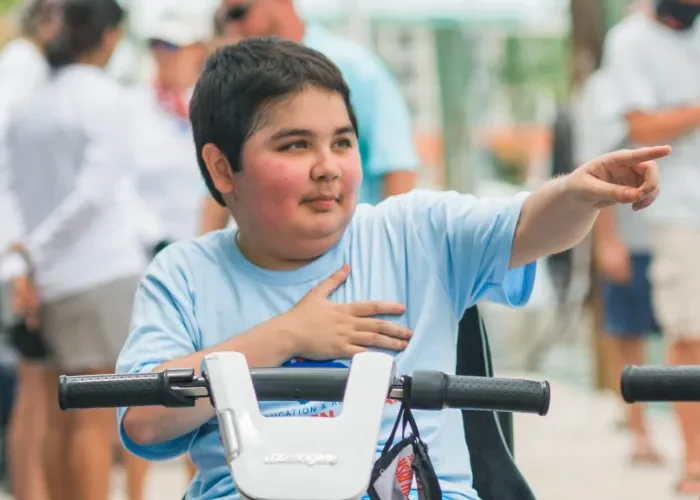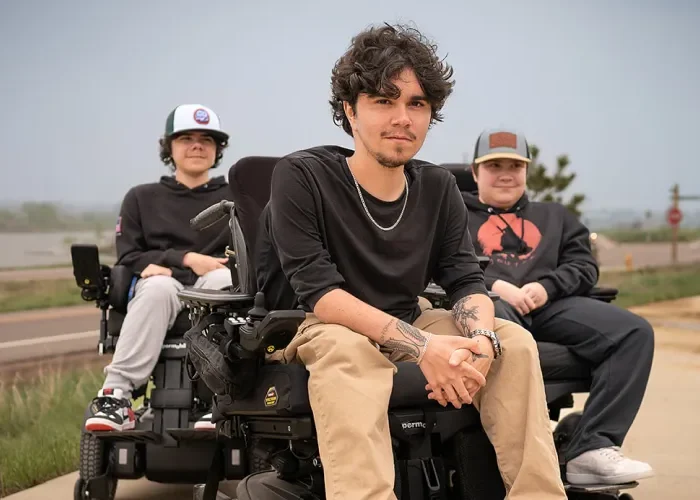Gibran loves spending time at his office. Though that might sound unusual for a 10-year-old boy, he truly enjoys passing the hours at his desk, in a makeshift cubicle in a corner of his family’s living room. From this modest vantage point, sitting in a large pilot’s chair, he plays, interacts, learns, and fulfills his desire to explore the expanses of the world through his computer.
For the longer version of this video, click here.
His appetite for information is voracious. “I like learning about other cultures, other places in the world,” says Gibran. He peruses YouTube looking for the most informative videos from faraway countries, learning all that he can about their history and customs. “I learned about Italy, and about Paris. I got to see the Eiffel Tower!” Many of his desires for travel are closely tied to his love of diverse cuisines, which he also learns how to cook from videos online. “I can cook fish, chicken, and other meats,” he says proudly. Lorena, his mother, encourages him to keep cooking, often buying him specialty kitchen utensils and ingredients as gifts. “He loves planning what we’re going to eat for dinner,” she says. “I like to let him cook. He decorates the plates. He does very beautiful work.” His passion even helps to alleviate some of her workload, which as a single mother of two, is no small feat.
Gibran’s dream to be an executive chef is only surpassed by one larger goal: to join the executive branch. “I want to become President of the United States because I want to do away with the companies that are causing a lot of pollution,” he purports with a sincere smile. “Then, we will get our electricity from solar panels. I want to stop the power plants because they’re bad for the world.”
These curiosities, quirks, and dreams fill his family’s home with hope, as they collectively grapple with the fact that Gibran’s life hangs in the balance. He lives with Duchenne muscular dystrophy (DMD), a rare neuromuscular disorder that has already begun to diminish his physical abilities. The x-linked genetic disease begins depleting muscle mass from an early age, hampering mobility before causing more serious complications to vital organs such as the lungs and heart. After being diagnosed at the age of six, Gibran and his family have been consumed in an effort to offset the worsening of his condition through educating themselves and supporting his aspirations—all the while praying for a treatment that will ultimately save his life.

For Alexa, Gibran’s older sister, this fosters a unique relationship. “He told me if he becomes President, the first thing he’s going to do is kick me out of the country,” she relays in jest. When asked why, Gibran answers, “She’s mean.” In many ways, the two are typical siblings. “But with us, it’s more complex,” explains Alexa. “I know that our time is limited. I feel like I should be more affectionate toward him or we should spend more quality time together.” Beneath her teenage appearance, the bubbly smile and mascara, lies a deep well of experience and maturity—exceptional for someone her age.
As much as the two quarrel, there are many moments of compassion. In their bedroom, Alexa helps Gibran put on a CPAP mask. As Duchenne advances, Gibran must utilize respiratory support to keep his lungs strong as long as possible. The rubber straps are cumbersome, but they both know that the effort it takes to fit them around his head properly is worth the increase in strength the therapy offers to Gibran’s lungs. A pulmonologist recently found a blockage there—a major cause for concern as his respiratory system weakens. With the cool oxygen flowing into his nose, Alexa lies down next to her brother and the two take a siesta together.
Outside the family’s mobile home in Glendale, Arizona, the midsummer heat bears down on the neighborhood, cooking the pavement into the triple digits. The whole family is accustomed to the desert heat. Prior to Arizona, Lorena lived much of her life in Chihuahua, Mexico, where her parents still reside today. After finishing university, Lorena had Alexa in the US with her first husband. Though she’d hoped to return to Mexico soon afterwards, the situation there was too difficult. “I had to leave Chihuahua because of all the violence,” she says. She would attempt to return home again, only to be thwarted by unforeseen medical complications.

Gibran was born four-and-a-half years after Alexa, in Denver, Colorado. In his early years, he consistently lagged behind his peers in physical developmental milestones. “He didn’t crawl, he didn’t speak, and he started walking very late,” remembers Lorena. “Compared to other children he couldn’t do the same things. He couldn’t climb the stairs or run.” He also fell a lot. When Gibran was two, he took an especially hard fall and went to the hospital with a head injury. He had fractured his skull. Fortunately, this caused no lasting damage, but a neurologist strongly cautioned against allowing him to take another tumble.
While the fracture did heal, Gibran continued to fall. He also exhibited odd, repetitive behaviors, which began to concern Lorena. Thinking he may be on the spectrum, she took him to another neurologist for evaluation. The specialist concluded that Gibran did not have autism, but Lorena’s anxieties did not disappear. “I knew that something was off, but I didn’t want to believe it. I told myself it would go away.”
In 2016, Lorena found a new pediatric doctor who first noted the large size of Gibran’s calves and ran a slew of tests. That July, they learned the results: Gibran’s creatine kinase (CK) levels were high, a clear indication that he might have some form of muscular dystrophy. Genetic tests were ordered, and a few weeks later doctors had a clear diagnosis.
At the time, Alexa was staying with her father in Colorado. “My mother called and spoke to my grandma,” she recalls. “Then, my grandma told me that my brother wasn’t okay—that something was wrong with him. He could stop walking or die. I just really wanted to talk to my mother. I started crying. My grandma was doing her best to comfort me.”
Lorena could hardly bear the news. She initially struggled to accept the reality of the diagnosis. “For the first week, I didn’t want to know anything. I just had the word in my mind all the time, ‘Duchenne, Duchenne,’ but I wasn’t ready to know [what it meant]. But then I asked and prayed. I asked God to give me strength to find information about my child’s condition.”
However, there were many hurdles to achieving this—principally language—as the vast majority of information on Duchenne was only available in English. She joined the DMD Moms Facebook group and reached out to Parent Project Muscular Dystrophy (PPMD), imploring them to share Spanish-language information materials. “We need more information in other languages, not just English,” she pleads. The organizations heeded the call, and Lorena began the arduous task of managing her son’s health.
“I often had to step in and translate in the hospital,” remembers Alexa. “It was crazy to have me, this young girl, translating all these complicated terms.” Being bilingual has been a huge help, as even hired translators often struggled to explain the nuanced and complex world of Duchenne. “I learned that Duchenne doesn’t have a cure,” recalls Lorena. “I learned that they have some medications that can help, and though they often have lots of side effects, they can improve the quality of my son’s life.”
With this information, she made the decision to start Gibran on cortisol steroids in an effort to slow his rate of growth and therefore slow the rate of physical decline. This was part of a larger plan to allow Gibran the best possible care. “It’s hard because we don’t have a Duchenne clinic here in Arizona,” Lorena says. Without a dedicated team of specialists, Gibran has to travel to different hospitals to see all the doctors he needs, and it can be difficult for them all to communicate effectively.
Likewise, Lorena has had to fight to get Gibran the educational resources he needs to get through school. “It’s not easy to get an IEP,” Lorena laments. “There was more than enough frustration and desperation because I know how much he needed it. I had to move him to another school district.” Gibran has been diagnosed with obsessive compulsive disorder (OCD) as well as attention-deficit hyperactive disorder (ADHD), which both impede learning in a traditional setting. “Now he has three teachers who help him.” Getting the proper educational support has proved transformative, and no doubt stokes Gibran’s fascination for the world. “He goes through so much,” reflects Lorena. “I admire him. He always stays positive.”
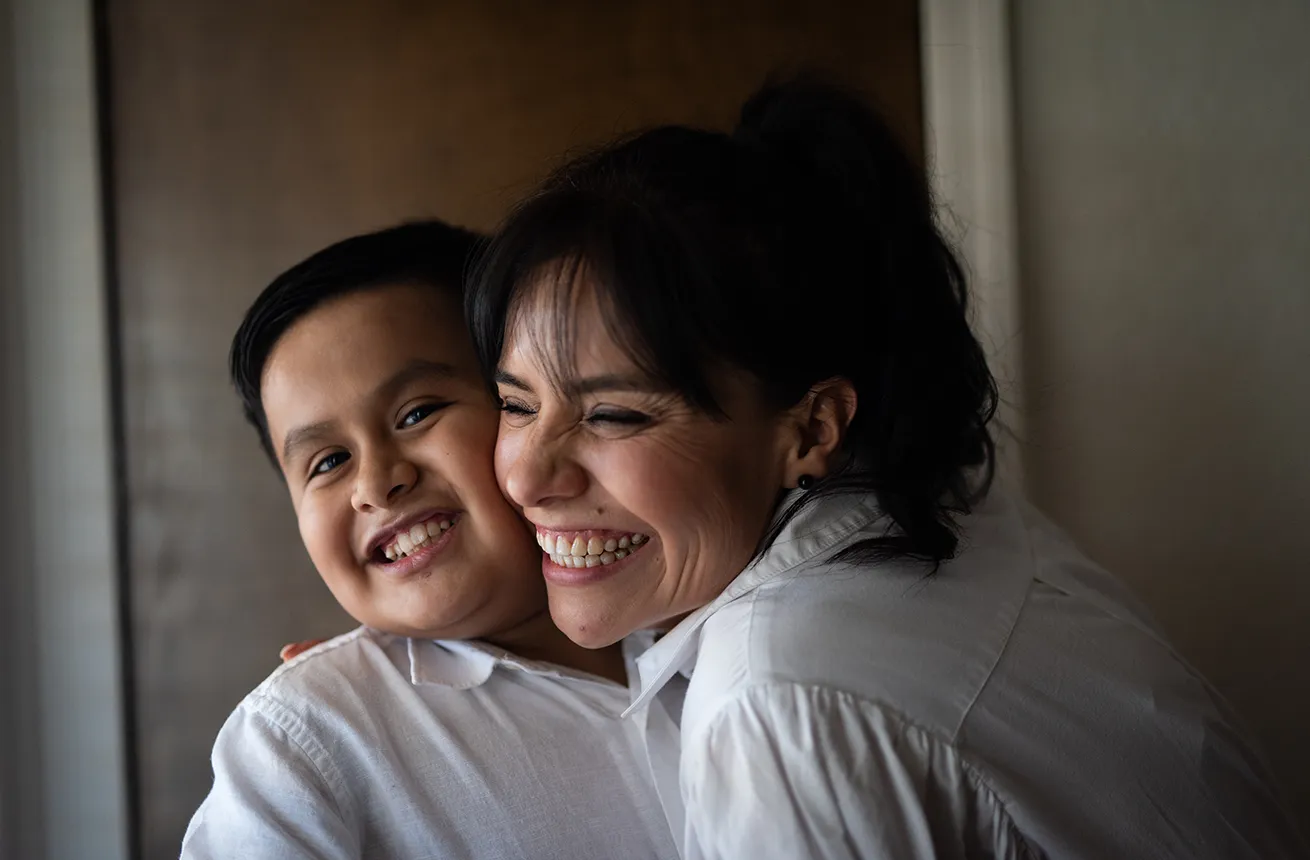
In truth, Lorena needs Gibran as much as he needs her. His quirkiness and sense of humor bring respite from the heavy feelings of loss and solitude that frequently invade Lorena’s thoughts. “I am a single mother,” she attests. “I have to question myself alone. I have to cry alone. I have to keep going.”
Lorena works in a school cafeteria, which allows her to align her schedule with her childrens’, providing Gibran with an adequate amount of time for homecare. The part-time work doesn’t pay as well as she’d like, but she needs the extra time off to care for Gibran. Lorena wishes she could get compensated for her home caretaking by the state, but is not an option in Arizona. Two years ago, the house they rented got sold, putting Lorena and her family in a precarious housing predicament. “They told me I had one month to move,” she remembers. “I was very scared.” Fortunately, her sister, one of her most steadfast sources of support, stepped in to cosign a new lease on the trailer that the family currently resides in today.
However, more costly additions await on the horizon as Gibran transitions more fully into using mobility devices. He currently uses a manual wheelchair and a mobility scooter, which was paid for, in part, by funds raised through a church raffle. While Gibran can still walk around the house, he most often prefers to use his scooter to navigate the outside world. With the scooter aimed down the street, Gibran can easily navigate the neighborhood, and though it requires two people to lift, it is small enough to fit in the trunk of Lorena’s car.
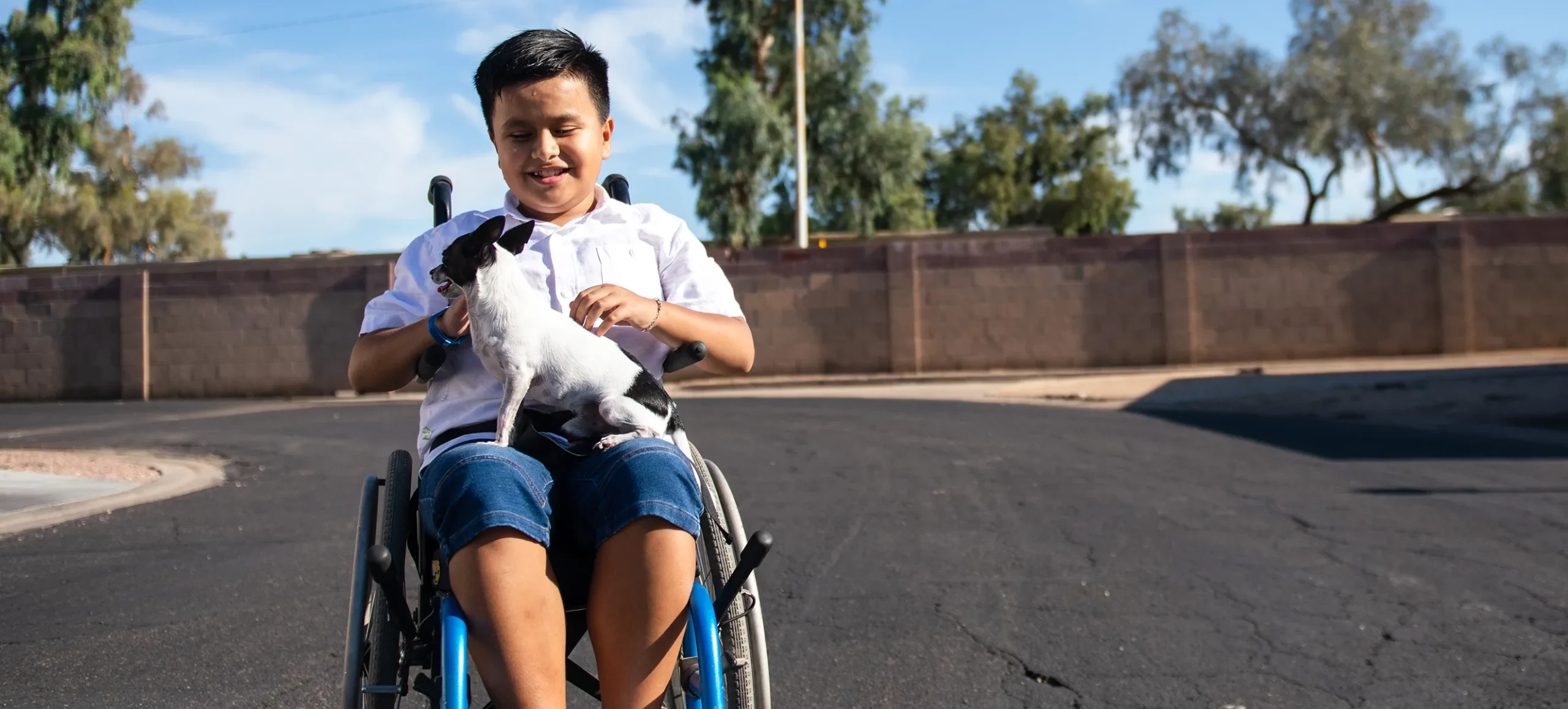
The electric scooter functions fine for now, yet as more of Gibran’s upper-body muscles weaken he will require a power wheelchair, a quintessential device for boys with Duchenne as they age. However, the chair will require a larger, more accessible vehicle, which Lorena doesn’t own or have the resources to purchase. It also requires numerous remodeling jobs around the house to allow a larger space to move around. “I try to take each of these things as they come,” relates Lorena, approaching the overwhelming feelings piecemeal when thinking about the future.
For the time being, she chooses to live each day to its fullest and enjoy her time with Gibran and Alexa as much as possible, cherishing the memories that are made and the delicious meals that accompany them. Alexa recently had her quinceañera party to celebrate her 15th birthday this past June. The gathering brought out dozens of friends and relatives who had been lying low during the pandemic. With a rare innocent look on his face, Gibran approached his sister and asked for a dance. Alexa took Gibran’s hands, and the two danced, celebrating each other with sincerity. “Alexa was very happy in that moment,” reminisces Lorena wistfully—joyous whenever her children actually get along. “Sometimes Alexa says to me, ‘I love my brother, but I cannot stand him.’”
